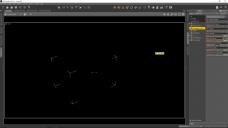How do I set iray to not stop rendering
 Bobvan
Posts: 2,652
Bobvan
Posts: 2,652
No matter on how high I set the settings it stops after 1 hour, what do I need to do so I can just let it run until I decide to stop it?


Untitled.jpg
1920 x 1080 - 169K


Comments
Are you sure it's not your machine that's going to sleep after one hour? On some machines, the sleep/hibernate mode may kill certain processes.
Double post.
Setting time and samples to -1 will stop them from being used, so only covnergence will count. But I agree with Tobor, if it's stopping after an hour and isn't 100% converged the issue isn't liekly to be the render settings.
Ok Richard will try that. I am pretty sure it reaches 100% hybernate is not an option since I am using SSD c drive and have all power settings to "never"
Max samples will not go below zero, but when I set those values the render does not start once I crank back the max samples up it get going but still it begins progressing pretty fast
I cranked up the times to over 100,000 will see how that goes
I have all sleep set to off on the nvidia laptop . I ran it on my AMD tower and went 5 hours. If that is the problem how does one resolve it?
Perhaps I didn't understand, but I believe that if it reached 100% convergence, it will stop.
Did you try the advanced Iray render settings? They set Max samples to 12000, Max time to 22000, Render quality to 2 and additionally you could uncheck Use Limits in the Rendering Converged Ratio parameter settings and set it from 100% to 200 or 300. I guess this way it would render on until you stop it.
So, what is the point of rendering after 100% convergence? What changes with the final result?
I put max time at several hundred thousands and still reaches 100% after just over an hour I do uncheck limits will keep experimenting
If it reaches 100% there's nothing more to do - 100% convergence is the point at which it stops changing. Iray wills top when any one of Max Time, Max Frames and Convergence hits its limit - if you take the others out of consideration then convergence will be the determining factor. If that isn't good enough you need to look at the quality settings, not the time/frame settings.
I've used the advanced render settings that came with the Gen3fem essentials or the default lights and shaders, and at about 65% I stopped the render because for me it was good. It was rendering for over 5 hours then and I didn't think the quality would be getting any better if I had it render for another 5 hours. So maybe Richard is right and upping the render quality is already enough to have it render longer.
I just thought of ways to make it render for a longer time, that's all. Besides that, when rendering at default settings the image quality is not always that great at 100%. So upping render quality might do the trick.
Does anyone know what the "Render Quality" setting really does? I'm suspicious when people say it gives a better render given it is a single slider. I have found that expectation bias plays a large role in things like this and that people are generally unaware of the phenomenon. It's why some folks insist on objective proof of a difference.
For the most part when the renders stop they do look complete. Having a decent nvidia gpu also makes a big difference. On my AMD machine a render that took 15 minutes took over 2 hours. Just as I am getting used to decent iray renders fast lux will be here tomorrow. I will most likely be using both engines, since I like them for different needs.
Render Quality is an internal metric that Iray uses to judge the threshold of when it considers a pixel to be converged. The higher this number, the higher the threshold. When the threshold is met, Iray considers the pixel converged. Render time is about doubled for every doubling of this setting.
For most types of scenes and lighting conditions, a value of 1 is sufficient. You only need to increase this value if you find there are still significant un/under converged pixels -- the darker spots that tend to congregate in darker areas -- even at 95% convergence. It's a waste of processing power to increase this value if your scene is already fully converged at 95%. (Think Green: your GPU and CPU is using power it doesn't need to.)
General information for readers: Which brings the discussion to another point: stepping convergence to 100% should not be necessary unless there are tough areas of the scene that have difficulty fully converging. Keep it at 95% (nVidiia's recommendation in their own documentation), and increase this value only when you must. You can visually see incomplete convergence. It buys you nothing if you can't see the difference between 95% and higher.
The devs have told us PAs that it can't actually reach 100% convergence, mathematically speaking - it was sort of an oversight that they left that in there when it can cause errors. Setting it to 99.9% avoids the potential problems.
I would think turning off Quality (which deactivates convergence and quality, so the render ends based on only samples/time) and just setting the samples really high would work, rendering-infinitely-wise.
Sickle if I am not mistaken did you not mention that increasing quality extends render times in your description of what the settings do? BTW thanks for the vids very helpful. I work "reality like" I adjust materials and simply add the lighting diffuse to the mesh lights so far its worked out well. I guess I am used to working the lux way letting it run until I like it. I hope the issue of making adjustments without having to re start a render gets resolved soon. With my GPU I rarely need to pass 30 minutes.. More like 10 to 15 on average. Im curious to see what lux will give me after tomorrow...
Yes, but it does so as multiples - 2 is 2x what it would've otherwise been, 3 is 3x, et cetera. But if there's a problem with max render time, turning off quality settings and just using the samples leaves fewer factors that could be causing it to end early.
Ok thanks
So I take it your renders look fine, but you are wanting (or expecting) a Lux-like experience, with forever rendering. If that's the case, the answers have been given above. To recap:
1. Turn Render Quality Enable to Off. This disables the two "stop-at" functions below the switch.
2. Set Max Samples "stop-at" to some ridiculously high value -- the highest is 259200. (You cannot set this to -1. Doing so will cause the render to immediately halt.)
3. Lift the Max Time "stop at" limits, and set it to -1. Though D|S doesn't allow for this by default, the -1 setting is the nVidia documented way to disable time from terminating the render.
Your render should now go on "forever" hough there is little qualitative reason to do so. Iray has these built-in "quality control" convergence estimates built into it, so that you don't need to keep checking the render to see if it's done cooking. They are estimates, but by-in-large, they do a reasonably good job.
@Tobor ". . . Internal metric that Iray uses to determine convergence"
Thanks. Exactly the sort of info I wanted. FWIW, so far I have been happy with results at the default settings.
Sometimes renders will end with extra minor noise but for the most part its a "just in case" feature. I can watch the renders in real time so its ok for me..
Light sparkly or dark noise?
Just shiny stuff like chrome shadres that seem to take a bit longer nothing like the old lux though
I cannot set samples higher than 15000. Whatever I type in above this, it just goes to 15000
Similarly it won't accept max time of -1. It just goes to zero and the render won't start
@Sertorial "I cannot set samples higher than 15000. Whatever I type in above this, it just goes to 15000"
Click the "gear" for the slider where you set max samples. Select Parameter Settings in the Drop Down box. Uncheck "Use Limits". This will let you set Max higher than 15000
Set convergence to 99% and set quality to a high number; that makes it work harder. :)